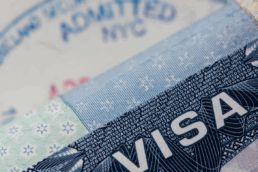To all our friends down under: if the H-1B lottery hasn’t worked out for you, don’t lose heart. The E-3 visa stands out as a fantastic back-up option, and is exclusively for Australians, offering a smoother pathway to employment in the U.S. Let’s explore how the E-3 visa could be your golden ticket, why applying at a consulate or embassy is your best bet, and what makes you eligible.
Understanding the E-3 Visa
Created specifically for Australian nationals, the E-3 visa is akin to an H-1B where it assists individuals seeking professional roles in the U.S.; in other words, it is a fit for those hoping to fill U.S. positions requiring the minimum of a baccalaureate education, where the individual possesses such education in turn. It’s not just an alternative to the H-1B visa; for many, it’s a preferred route, thanks to its unique benefits:
- No Lottery System: Forget the uncertainty of the H-1B lottery. The E-3 visa is direct and accessible, with a quota of 10,500 visas annually that rarely gets fully utilized.
- Renewable Indefinitely: You can renew your E-3 visa in two-year increments, with no maximum limit on renewals as long as you maintain eligibility.
- Faster, Cost-Effective Processing: Generally, the E-3 visa process is quicker and less expensive than the H-1B visa process, making it an efficient choice for Australian professionals.
Eligibility Criteria
To qualify for an E-3 visa, you’ll need to:
- Be an Australian citizen.
- Have a legitimate offer of employment in the U.S. in a specialty occupation that requires theoretical and practical application of specialized knowledge (similar to the H-1B requirements).
- Possess the necessary academic or other qualifying credentials.
- Demonstrate your intent to return to Australia upon the expiration or termination of your visa. Note: this does NOT mean that you cannot pursue permanent residency on an E-3; it simply means you cannot renew your E-3 once an adjustment of status has been filed on your behalf.
Why Apply at a Consulate or Embassy?
While it might be tempting to seek a change of status through USCIS if you’re already in the U.S., applying for your E-3 visa at an Australian consulate or embassy comes with a significant advantage: you receive a travel document. This isn’t just a procedural difference; it’s a huge benefit for those who love to travel or need the flexibility to enter and exit the U.S.
- Flexibility to Travel: Applying through USCIS for a change of status to E-3 does not grant you a visa, just the status. This means if you leave the U.S., you’ll need to apply for the actual visa at a consulate or embassy before re-entering. Getting your E-3 visa at an embassy or consulate first saves you this hassle.
- Straightforward Process: Directly applying at an embassy or consulate can be more straightforward. You’ll need your job offer, proof of your Australian citizenship, your academic credentials, and a DS-160 form. Interviews are usually friendly and focused on confirming the details of your employment and eligibility. We find that consular officers do not scrutinize these cases anywhere near as closely as USCIS does.
Tips for a Smooth E-3 Visa Application
- Documentation is Key: Ensure all your paperwork, from your job offer to your qualifications, is in order. Clear, concise documentation makes the consular officer’s job easier and your interview smoother. Of course, we recommend using the services of an attorney to prepare these filings.
- Understand Your Role: Be able to clearly explain how your job fits into a specialty occupation and how your background qualifies you for this role.
- Plan Your Travel: Applying at a consulate or embassy means thinking ahead about your travel plans. Make sure to schedule your visa appointment well in advance of your intended travel date to the U.S. We also recommend that you plan to stay in the country of your interview for at least 7 business days following the date of interview to allow for adequate time to receive your visa back from the consulate.
For Australian students facing the H-1B lottery blues, the E-3 visa category is not just a backup; it’s a strategic, advantageous choice that aligns with your career aspirations in the U.S.
Ready to have Berardi on your side?
Whether you’re a business looking to hire or a professional hoping to relocate, immigration law can be complicated. But you don’t have to do it alone. Put our experience to work for you.



